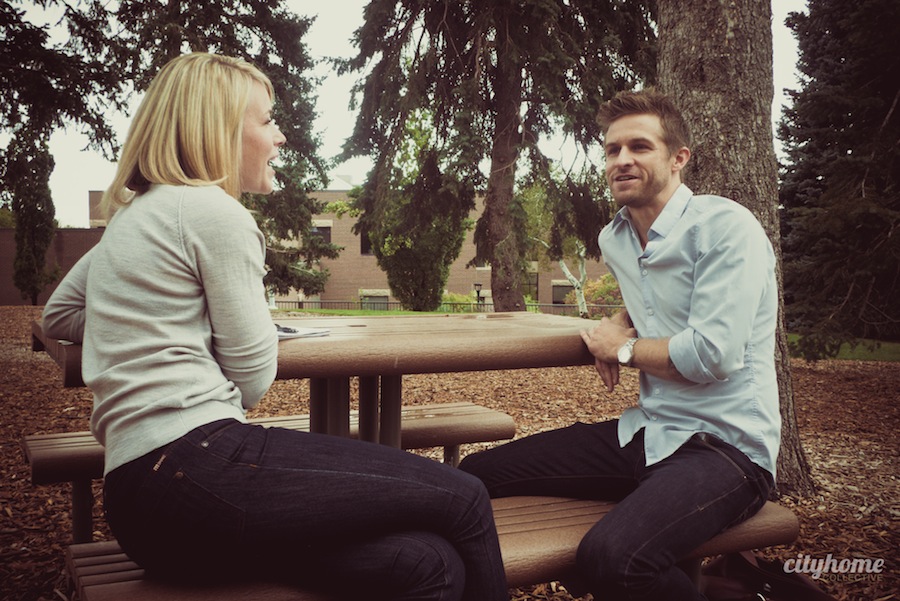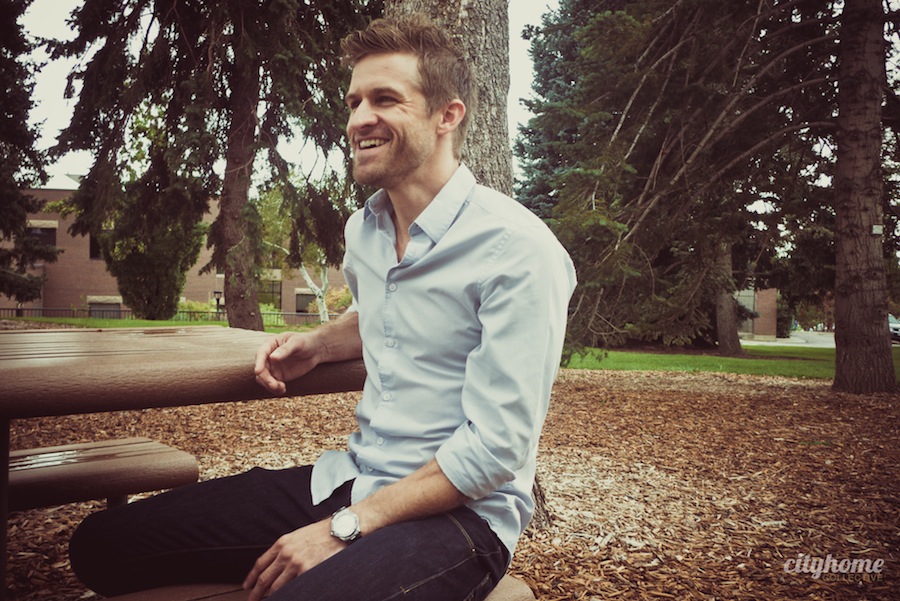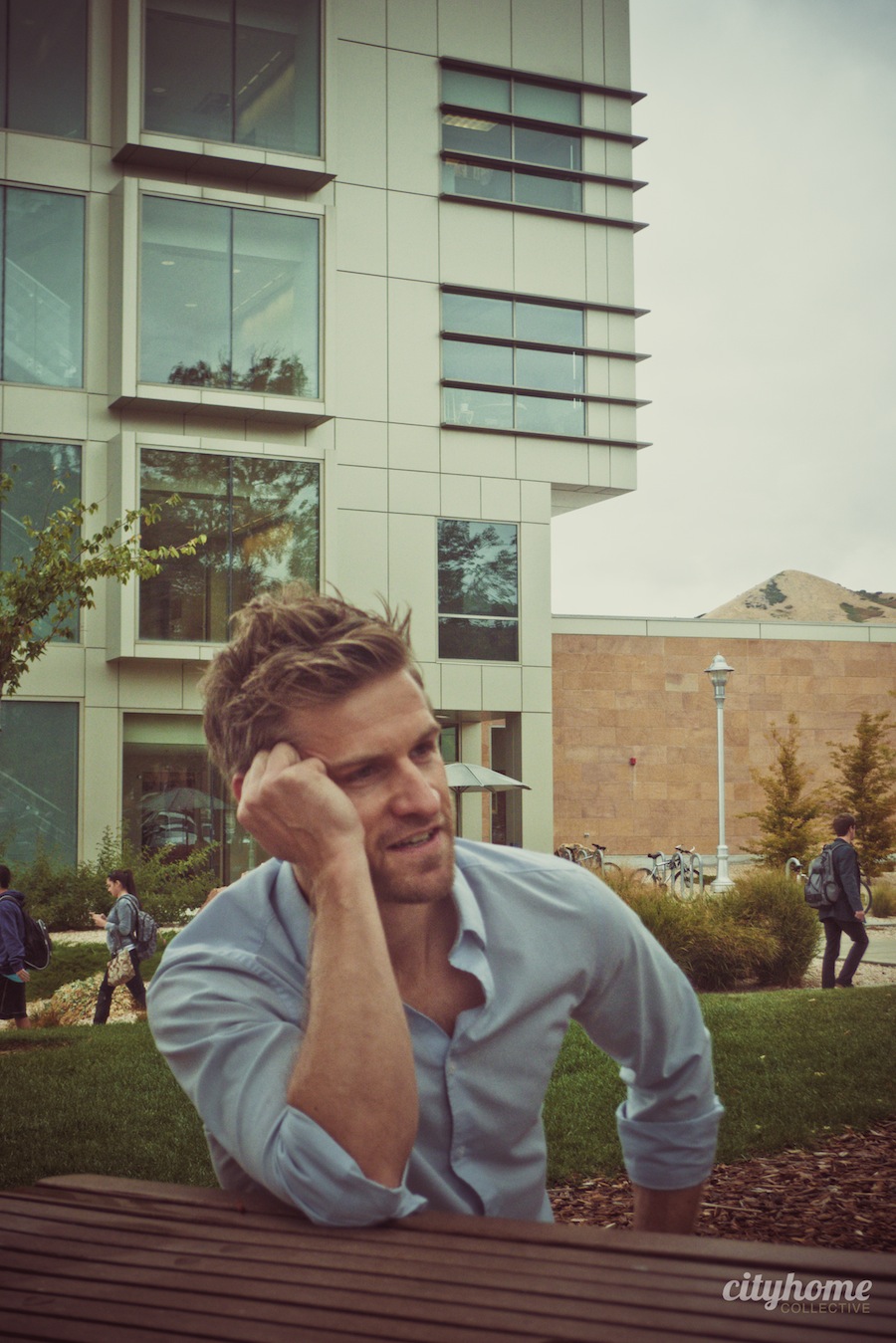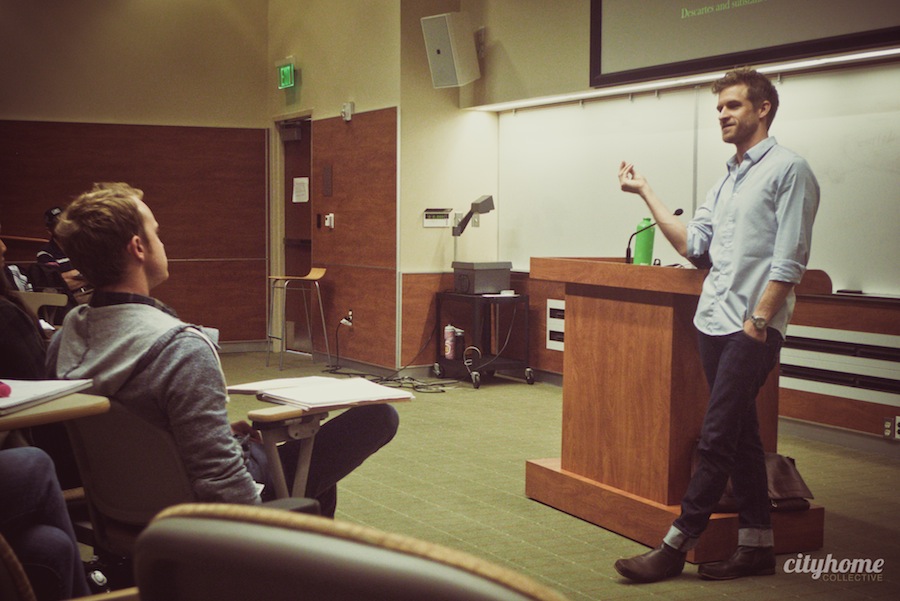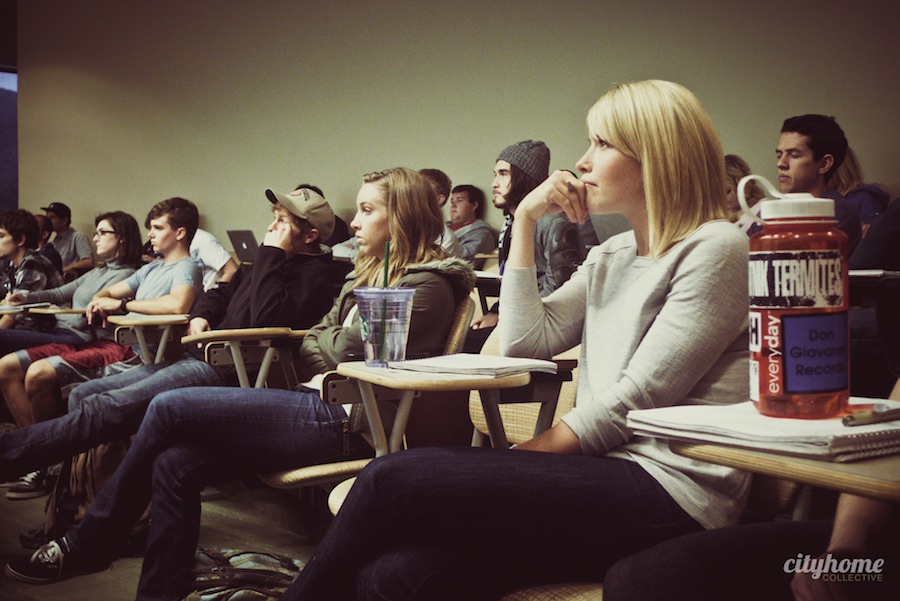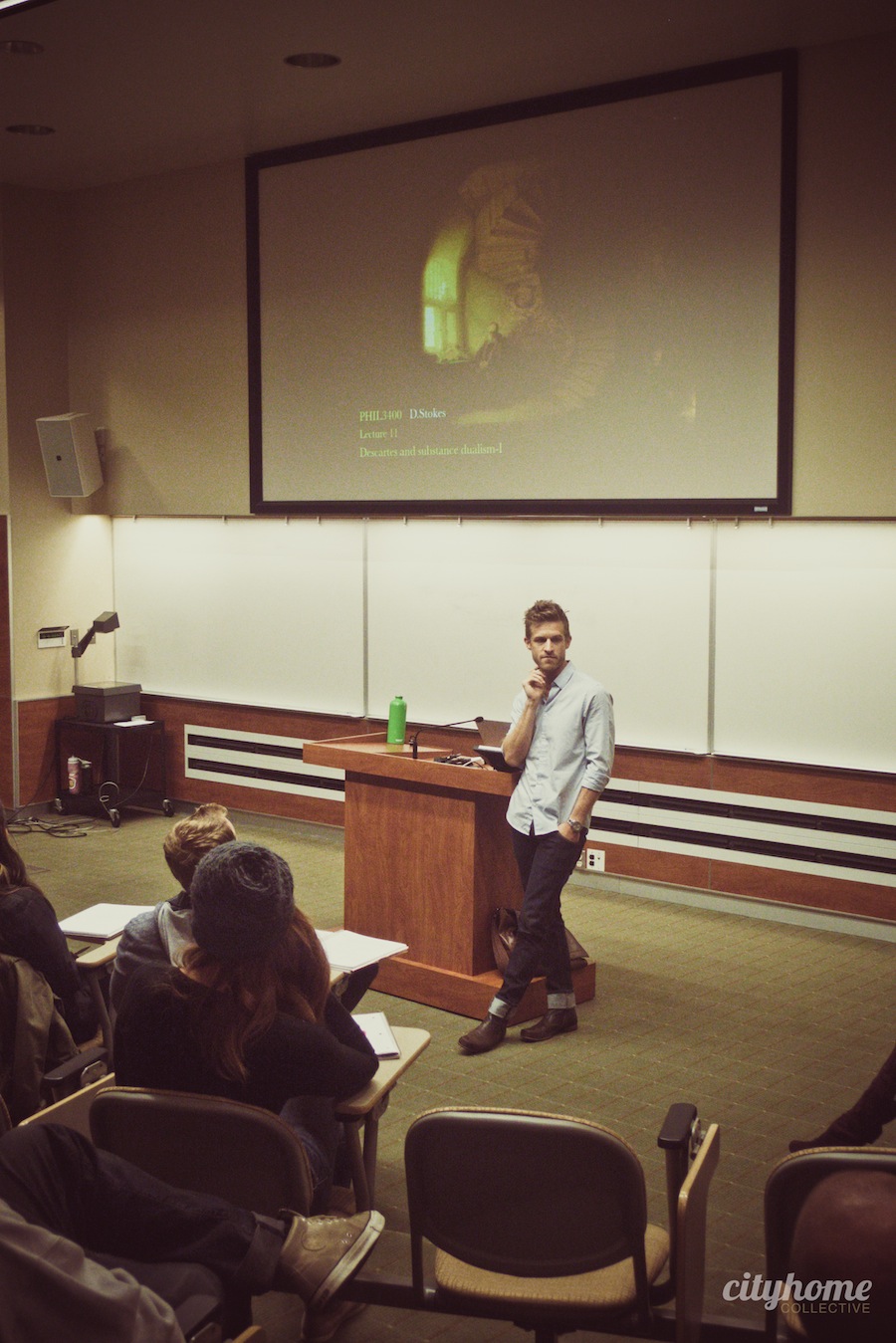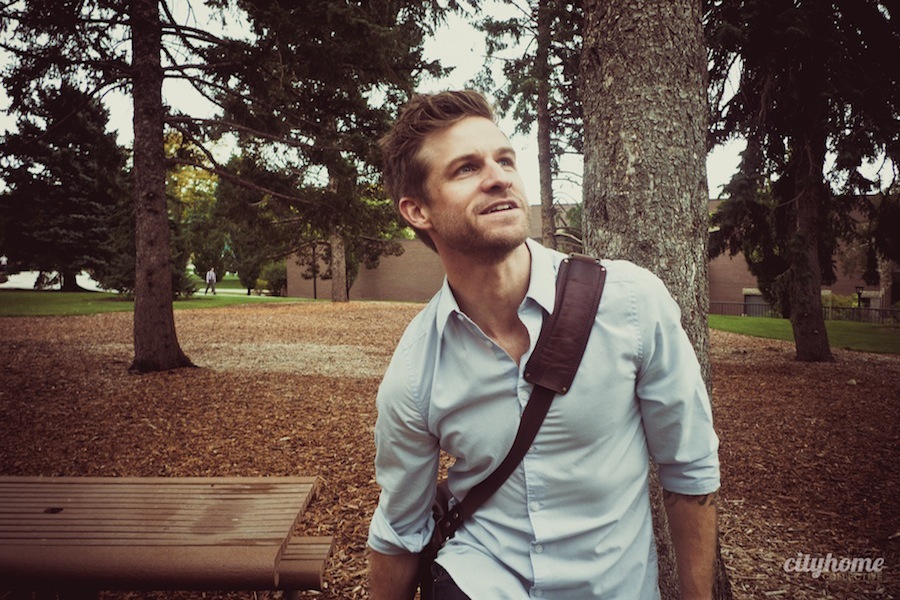We keep telling you that peeps are flocking here in unprecedented numbers; talented, wise, crystal cool ones. A recent import [from other fabulous countries, a.k.a. UK and Canada] landed here somewhat recently and sought our COLLECTIVE help in finding his space. Ladies and gents, meet Dr. Dustin Stokes, a doctor of philosophy and a now firm fixture at the University of Utah. Ever seeking to hear the varied outlooks on life, we couldn't resist a chat and some teachings.
We sat in on a lecture and got properly schooled in the thinkings of Descartes. You know, the 'mind/body problem'. Students followed easily and challenged principals and theories...I was scribbling notes and hearing it all for the first time. Dr. Stokes is a passionate, engaging professor who thrives on seeing the light and thought in his listeners. Happy to have a mind like his in a city like ours. Read on...
Think we covered a little bit, but how can we all benefit from a little philosophy in our lives? Care to elaborate? I think there are many ways to benefit from philosophy, but here are two fundamental ways: First, in substance, I think philosophy is largely about wonder and curiosity. Being interested in philosophical questions involves wondering, being curious about the world and how to understand it. What makes us the individual persons we are? What is a mind? What does it mean to be just or good? These questions spark curiosity. And this is a good thing. When we stop being curious, we become complacent. So, philosophy encourages a healthy sense of wonder. Second, in method, philosophy involves careful and precise thinking. As philosophers, we emphasize reasons and arguments for any claims that we might want to make. This is important no matter what you do: if you don’t have reasons for what you believe or claim, or you can’t articulate those reasons, your behavior is nothing more than hand waving and foot stomping.
Perception is reality. I'm a big believer in this. You? In one sense, yes, I agree with this. What we bring to our world —our attitudes, emotions, hopes, enthusiasm, and so on—colours how we make sense of and enjoy our world. So, the reality an individual lives in, as it were, depends importantly upon the individual. But in another sense of ‘perception’—the sense that a lot of my work concerns—this isn’t quite right. When philosophers and cognitive scientists talk about perception, they often mean sense perception: seeing, hearing, tasting, smelling, touching...and here it seems more plausible that there is a reality out there, and we perceive it. Sometimes we get it right. Sometimes we get it wrong. But it is there, to be gotten right or wrong.
Finally, to bring the two thoughts together: a lot of my current research begins with the assumption that there is a mind-independent reality out there (“the world” we might call it), and that we access it through sense perception, but that our background knowledge, beliefs, desires and so on, may result in seeing, hearing, and otherwise perceiving the world differently. So the painting or the wine or the last minute basketball shot may be sensed differently, by different persons, as a result of what they want or believe. This, I think, is a very interesting but more nuanced way in which perception is reality.
You have a great interest in creative thought and behavior. What type of research have you done? Where is it headed? Any interesting conclusions to date? Any why has it been avoided by the 'other' great thinkers? I think creativity has been avoided by scientifically-minded philosophers and theorists in the past for the reason that it seems like such a magical thing. The anecdotal reports of creativity—of famous scientists and artists—often involve some apparently inexplicable burst of insight, an “A-ha” moment. As a result, theorists romanticize the concept of creativity, concluding that it is something we can’t explain. It’s magic!
My view is that this conclusion is partly the result of a bad choice of starting point. Don't start the analysis of creativity with Bach or Einstein or Picasso. Start with something more mundane. Think about how more ordinary folks like you and I can, on a good day, act in a way that is creative: we think of a clever turn of phrase, or way to fix something, or a shortcut on our way home. These acts may not be of the same caliber as that of geniuses, but they are of the same kind; they are minimally creative acts or thoughts. With this as the alternative starting point, then begin to ask about what goes on in the mind when we think these more mundanely creative thoughts. How much skill is involved? What is the role of the imagination? How much of the process is deliberate and how much of it is “unconscious” in some sense? I think the phenomenon becomes much more approachable for science and philosophy once we re-adjust the starting point in this way.
One conclusion to date, very briefly. We have all heard stories about a scientist or artist working on a problem or task, who then goes and does something else, and when she returns to the task—bam—a burst of insight. So something happened in that intermediary stage; this stage is sometimes called incubation. And this stage, historically, is supposed to be magical or inexplicable. I think this supposition is wrong. We don’t know a lot about the brain, but one thing we do know is that it is plastic—how information gets processed in the brain, the “networking” of the brain as it is sometimes called, changes as we engage with our environment. Put simply, what you attend to will change the connectivity in your brain and, as a result, this will affect the types of thoughts you are likely to have (indeed, the thoughts that you can have). This is an uncontroversial fact of the brain sciences, and it can explain incubation. Put crudely, when the creative person works on her task, she affects the connectivity in her brain, and these changes continue to take place after she has removed attention from that task. So when she comes back to the task, after napping or daydreaming or grocery shopping, there may be new or newly strengthened connections. And these connections can result or give rise to a new thought, to a burst of insight. This doesn’t make the A-ha moment any less interesting, but the explanation of that moment doesn’t require magic.
What's new in the world of philosophy? Anyone or any major thought processes making waves out there right now? Sheeze...when do I get the easy questions? One very good trend in philosophy, I think, is an increase in interdisciplinary approaches. This can be unpacked in many ways. Philosophers today seem more open to a less hyper-specialized approach. So there is more overlap between traditionally disparate fields within philosophy. For example, you have more philosophers working on relationships between mind and art, rather than working on just one or the other. And not unrelated, philosophers are less myopic in how they attempt to explain things. So, forty years ago, a philosopher of perception, say, would focus just on sense perception. But today, philosophers are broadening the scope of what they consider relevant for the same explanatory task. They ask questions like: What can action tell us about vision? How does what one knows or believes affect how one senses the world? And even more broadly, philosophers are more sensitive to what is going on in relevant non-philosophical disciplines. For example, as a philosopher of mind, I pay a lot of attention to what is going on in the behavioral and brain sciences. There’s data out there, man; use it!
How has what you do/teach affected your space and how you live? I think I just hyper-analyze everything. I put a lot of thought into how things come together in my space (and this is further encouraged by some of the subject matter of some of my research, which concerns art and aesthetic experience). And certain life-living principles—what I eat, what I buy, how I travel, what kinds of businesses and activities I try to support—are guided by philosophical thought and reflection. Erm...I think a lot: whether it is buying laundry detergent, mounting art on the wall, or writing a paper.
How often are you surprised by your students? All the time. I won’t lie, my students don’t always make me happy. But...most people don’t! And on balance, my students stimulate me, excite me, and remind me why I do what I do and of the passion that got me here to begin with. One especially fun thing about teaching students philosophy is that they often find an insightful angle on the philosophical questions/theories at hand, sometimes one that you have long forgotten, and in the best cases one that you’ve never thought of yourself. So they surprise me by keeping things fresh. Without my students, I wouldn’t love my job the way I do.
What book(s) are you reading right now? Skipping the stack of philosophy books and articles…I’ve been laboring through Cormac McCarthey’s Blood Meridian for some time now. Also on my bedside table is W.S. Merwin’s The Second Four Books of Poems and the latest volume of McSweeney’s Quarterly. I love books, y’know...the old-fashioned kind with physical pages and a binding and such.
How would you make Salt Lake City healthier? Clean the air, clean the air, clean the air. See below.
Is there something you’re looking forward to? Snow. Lots and lots of snow on the slopes. It’s been many years since I’ve had slopes within striking distance. And I just bought a new snowboard. It’s so pretty…
Do you follow any blogs? Tell us your 3 favorites: I only read the City Home Collective blogs. They are THE best. OMG. Epic. Like, totally.
Who or what inspires you? Perhaps predictably, creative thought and insightful thinking inspire me. As a species, we’ve been trying to figure out the world for a very long time, for 40,000+ years by one plausible estimate (when the so-called “creativity explosion” occurred). And yet we still come up with new ideas. In the context of this time frame, this capacity for novelty always strikes me as amazing and, accordingly, inspiring.
In all your travels, why Salt Lake? Well, the University of Utah brought me here. So thank or blame them. But, from what I know of it, SLC offers many of the urban features I relish, coupled with an abundance of mountain and forest activities. There you go, a textbook clichéd answer. But, some clichés are true after all. Oh...and the weak beer. Oooh and this Zion curtain thing; that’s pretty rad. There must really be some sinful magic back there: they go behind it with some bottles and come out with cocktails!
If you owned Salt Lake City you would? I’d take fairly radical measures to clean up the air. I’m new here, but already I’ve heard the geographical excuse for the air quality all too often. (You know the one. It begins: “We live in a valley...”). We can’t simply acquiesce in poor air quality because the region presents special challenges. If we want to live well here, we have to take extra measures to overcome those challenges. So...I’d impose lots of taxes and tolls: taxes on unnecessarily large vehicles, taxes to own more than one vehicle per family in the city, tolls to exit the freeways into the city. I’d offer various incentives: for using public transit, for driving an energy efficient vehicle, for participating in renewable energy programs. And I’d filter (more) money into the UTA, coupled with an increase in available services. As it stands, UTA’s services fail to provide a viable alternative to driving for many people of SLC. I’d be a very unpopular owner/mayor, at least to the current population. But I think that would change after two or three generations.
If you could design anything, what would that be? A stupidity-zapper. When people engage in lazy, sloppy, dumb thinking, you press a button and it zaps them and…voila….they reason out of their stupidity, right before your very eyes. It would be tons of fun, and it would make the world a better place. I fear they would need mass production right away.
Talk about "creative energy". Where do you get yours? What does it look/feel like? I have no idea. It’s inexplicable magic. But stuff from behind the Zion curtain helps.
Share a pivotal moment of your life: As an undergraduate, I intended to major in philosophy and go on to law school. At the same time I was minoring in creative writing and involved in lots of other activities (e.g. working in local restaurants and learning a lot about food and wine). In my third year, I had a meeting with my philosophy advisor, Jack Knight. Jack asked me what my plans were. I replied, without much thought, by saying that I still planned on law school. He gave me a very straight look, shook his head, and said “Man, don’t…do it”. (There was an expletive in there; I’ll let the reader fill in the blanks.) I was confused, “What do you mean?” Jack proceeded to tell me how unfitting law school and the life of a lawyer would be for me, given my sensitivities and varied intellectual interests. I followed him that far and then asked, “Well, then what should I do?” Jack replied by saying that although he would recommend it only with a lot of caution, given a scarcity of jobs and other factors, I could do what he does. I was talented and motivated enough, he suggested, and may be happy with the life of a philosopher. I was still a bit confused, so, I replied, “You mean…be a professor?” “Yes”, Jack replied. I thought about it for all of twenty seconds and naively replied, “Okay, I’ll do that.”
Two years later I was in graduate school working towards a PhD in philosophy. And…here I am now, a professional philosopher. Thanks, Jack. I think.
Share your opinion on aliens: I’ve never met any. Since I try hard to not talk out of my ass, I’ll reserve comment until one shows up at the pub and sits down next to me. I’ll keep you updated.
Were you born in the right time period? Of course! I was born in the 70s! That’s still cool, right?
What catches your eye on the street? Erm, I’m going to leave that one alone.
What’s your favorite room in your house? My kitchen. My brain connectivity is regularly re-wired there. And it tastes good.
Describe your favorite place you’ve ever lived: Very, very hard to say. But: I loved the sea and sky and air of Vancouver. I loved the European sensibilities, coupled with British grit, of Brighton, U.K. And I loved the neighborhood charms and fringy artistic culture of Toronto. C’mon, SLC, show me what you got!
